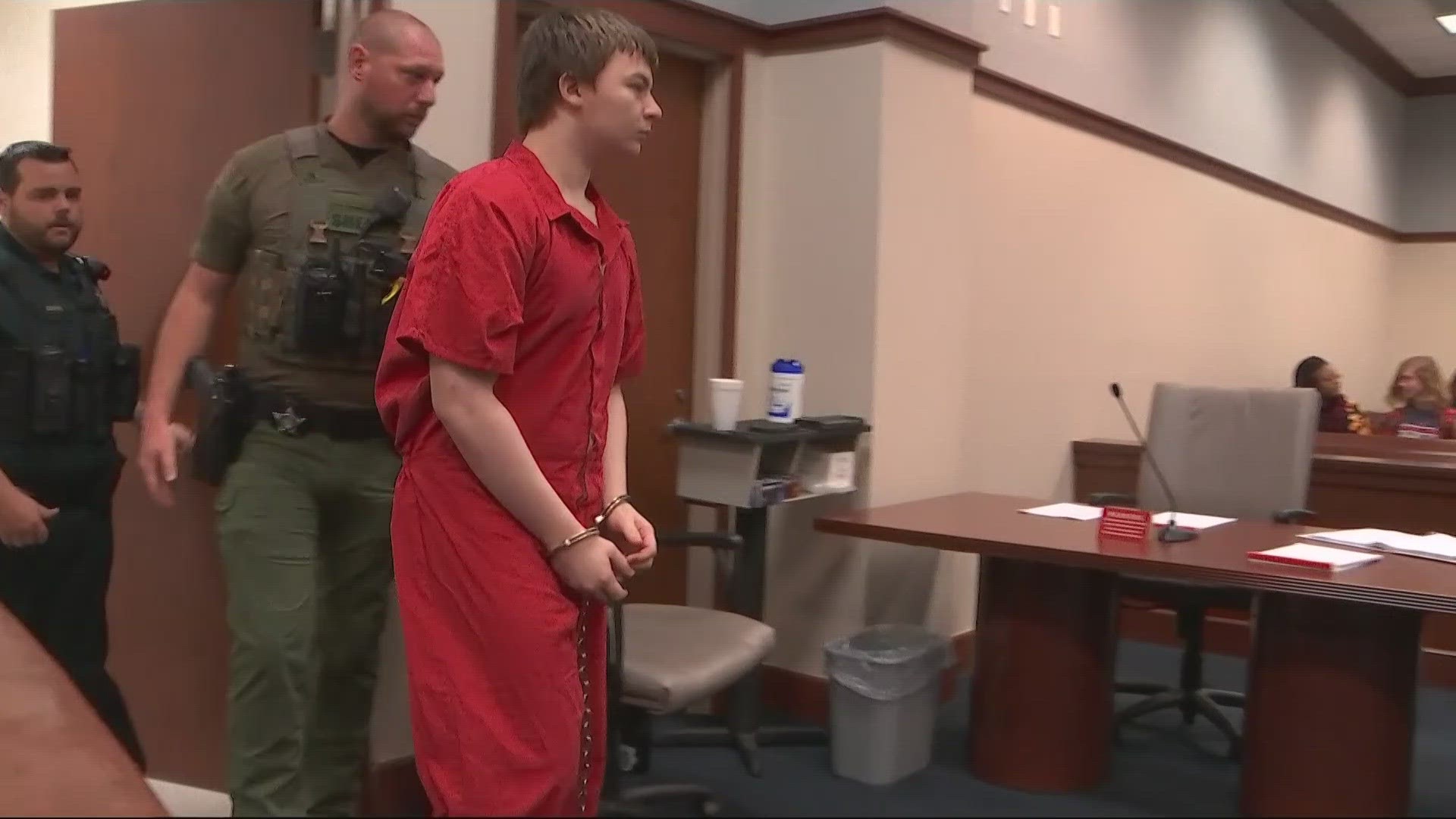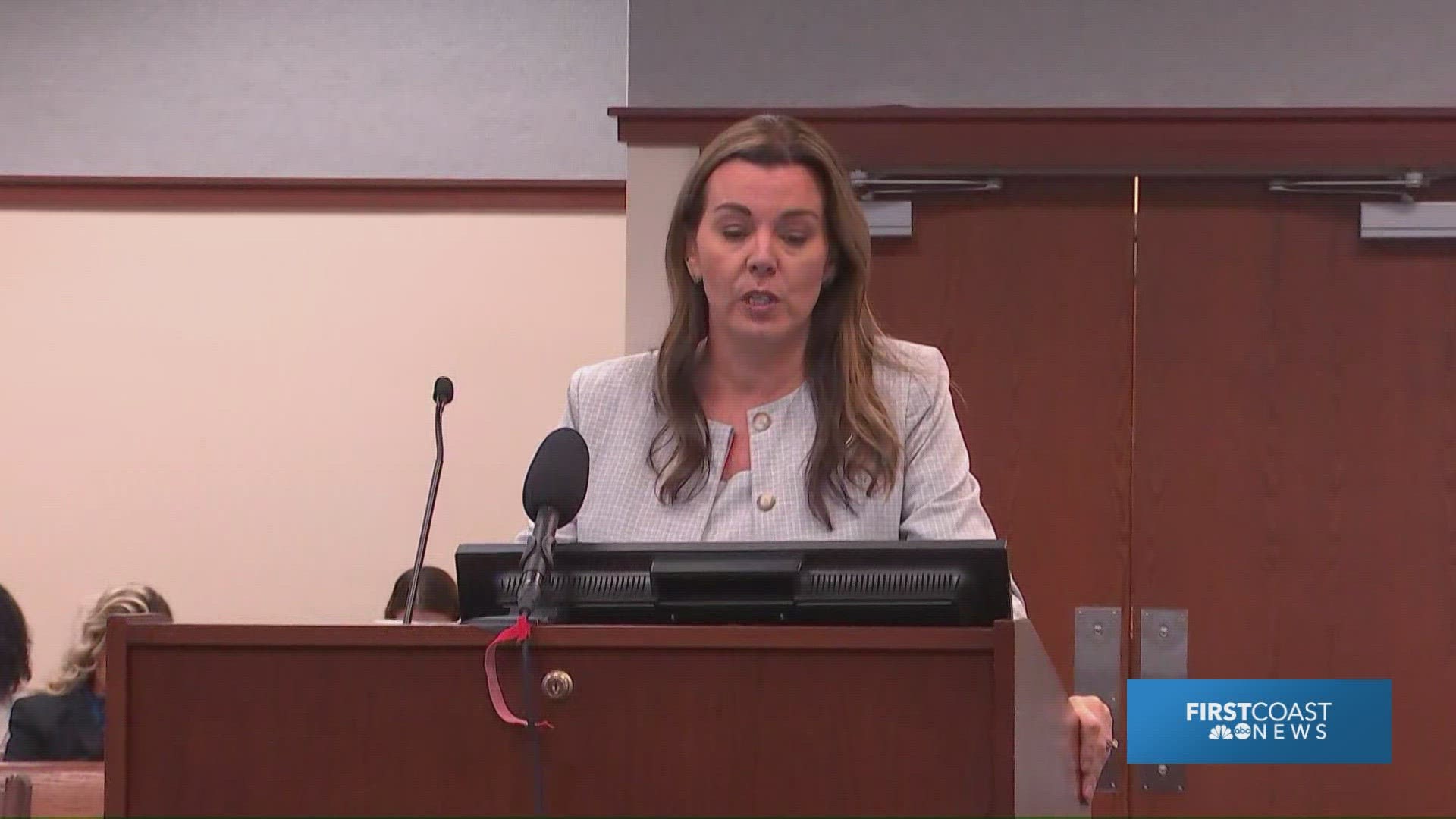40 years or life: Judge will make decision in Aiden Fucci case Friday
At 16, Fucci faces the possibility of life in prison. In closing, his attorney stressed his youth when asking for a 40-year sentence, while the State asked for life.

After nearly two years, Aiden Fucci will learn his fate Friday.
After two days of testimony and emotional victim impact statements, prosecuting attorneys representing the state of Florida and Aiden Fucci's defense team delivered their closing arguments. Court will take a one-day recess and return on Friday morning.
Fucci pleaded guilty in February to stabbing his classmate Tristyn Bailey, 13, 114 times on Mother's Day 2021.
Fucci, who was 14 years old at the time, is now 16. He faces the possibility of life in prison. The minimum mandatory for the crime -- first-degree murder -- is 40 years.
Fucci cannot receive the death penalty because he is a minor.
Also because he is a minor, regardless of what sentence the judge decides on, Fucci's case will be up for review in 25 years.
State Prosecutor Jennifer Dunton asked that Fucci be given the maximum of life in prison, while his attorney, public defender Rosemarie Peoples, asked that that Judge R. Lee Smith give him 40 years.
Peoples said in her argument that Fucci will be punished, "and should be," but repeatedly stressed that he is "a child."
She submitted letters from Fucci, his mother, Crystal Smith, and his father, Jason Fucci, to the court before she began her statement. She said that the letter, written by Fucci in early March, contained an apology, "to the best of his ability."
While she gave her opening statement, Peoples displayed pictures of Fucci as a young child -- seemingly healthy and happy.
The prosecution: 'He wanted to do it'
State Attorney Jennifer Dunton began with the saying: "Pictures are worth a thousand words."
She addressed the judge, referencing photos of Tristyn's dead body: "I know you will never forget those photos." She talked about how Tristyn was alive during the attack, evidenced by the defense wounds all over her hands and arms; how she would have suffered and how her family has to reckon with that fact.
"She was conscious and alive for this attack," Dunton said. "She was fighting."
Dunton next referenced testimony by Dr. Gregory Pritchard, a psychologist who testified on behalf of the prosecution Tuesday.
She summed up his testimony: "Something is seriously wrong with Aiden Fucci, and in a bad way."
The judge is being asked to consider whether the crime was "impetuous," meaning Fucci was acting with impulse.
Dunton spoke about Fucci's documented preoccupation with "death and killing."
"That's not youth," she told the court. "That's not poor decision-making."
Fucci told his girlfriend that he intended to kill, and the way he intended to do it: "He wanted to do it. He said it would be a night, he would drag somebody in the woods and he would stab them. He said it would be soon, within a month. He said he would 'act innocent, keep killing and then run away.'"
This crime was not the product of impulse, she argued, but long-planned.
"He knew when, and he knew it was going to be soon," she said. "His 'when' ended up being may 9, 2021, and his 'who'... ended up being Tristyn Bailey."
Fucci's possibility of rehabilitation was a topic of debate during the two days of testimony. Dunton said while the ability to change Fucci will be a bigger question in 25 years when his case is reviewed, the court can still examine Fucci's current prognosis.
She referenced Pritchard's testimony that because of Fucci's behavior after the homicide, where he was laughing and filming Snapchat videos in the back of a police car, he displayed unusual patterns and had a "poor prognosis for rehabilitation."
'He was the only person in the world who knew where Tristyn was'
"The behavior he exhibited when he was the only person in the world who knew where Tristyn was, who knew that she was laying in the wood, dead from his actions," shows Fucci had no remorse, Dunton said. "His demeanor in the interview rooms, just showing, he's calm, he's asking his parents 'why am I here? What does this have to do with me?' (He) told his parents he wasn't scared."
She argued that Fucci had every chance to succeed in life -- "he had it all, he was spoiled" -- and chose a path of violence.
Dunton also referenced reports that Fucci had extorted inmates and guards in prison -- incidents that his attorneys filed multiple times, unsuccessfully, to keep off the record.
She reminded the judge that the reason for this sentencing is to decide if Fucci deserves "the hardest punishment out there," and that these factors all suggest the answer is yes. And maybe in 25 years, she said, Fucci can "attempt" to rehabilitate himself.
Another factor that Judge Smith must weigh is the effect Tristyn's death had on her family and community.
"This family has lost something immeasurable," Dunton said in her argument, and so has Tristyn's St. Johns County community and all who knew her. Vigils, ribbons, wearing the color aqua (Tristyn's favorite color), and over 100 victim impact letters showed just that; as well as emotional testimony earlier in the day by each memory of Tristyn's family.
The defense: 'A child is now before the court for the life he took of another child'
Peoples, Fucci's attorney, began:
"Fourteen years old. One-hundred and fourteen stab wounds. Those are numbers. They're not insignificant. But they're numbers."
Throughout her argument, she repeated the word "child" each time she referred to Fucci.
She presented a stark reminder of Fucci's youth: The last grade he completed was the 7th grade; he entered the Department of Corrections system in 8th grade.
"A child is now before the court for the life that he took of another child. Horrific. Heinous. Horrible. Are just some of the words that have floated around regarding this offense. But we still have to look at the circumstances."
The issue of maturity was raised again during Peoples' argument. She referenced Fucci's infamous Snapchat videos: "Throwing up a peace sign... that's not maturity."
At 14, Fucci was still considered an "early adolescent" and his brain was not fully developed, she said.
Risky behavior by Fucci, she said, "didn't start and end with Tristyn's death." She referenced him sneaking out and smoking marijuana; mistakes he made "because he was a child."
Peoples argued that he did not make an effort to conceal the body, pointing out several ways he could have done more to hide his crime (thrown his shoes or clothes in a pond, covered Tristyn's body with foliage).
A constant issue during the sentencing was Fucci's mental health, and Peoples said in closing that he was "not mentally well" when he killed Tristyn.
Fucci told a correctional officer he was hearing voices, testimony that Peoples fought to have admitted into the courtroom; she referenced this claim as evidence that Fucci was unwell.
No one really knows what Fucci's home life was like, she said: "Aiden's family loves him, and they care for him, and they don't understand what happened. But what was his daily life like?" The evidence is mixed; his sister said he was neglected "emotionally," and his girlfriend said he reported being abused by his biological father, but his grandmother testified about his loving childhood, and his brother said their father was "fantastic."
READ MORE: Aiden Fucci's grandmother's testimony
'Nothing moving forward for Aiden Fucci will be easy, and it shouldn't be'
Peoples did not deny that Fucci should be punished, acknowledging that the loss of Tristyn left an enormous impact.
She advocated for Fucci to receive a 40-year sentence, pointing out that as an inmate with a release date, he will be afforded privileges that inmates with a life sentence may not receive.
She said that Fucci should be allowed to get further education and learn a skill inside prison, so that he can present himself as someone with skills at his hearing in 25 years.
"Forty years is not a light sentence, it is not an 'easy' sentence," she said. "Nothing moving forward for Aiden Fucci will be easy, and it shouldn't be. But the 40-year sentence doesn't make light of what happened on Mother's Day in 2021. It is still punishment."
Peoples stressed again that this is a sentence "for a child that came before the court and pleaded guilty." She continued to express that Fucci was apologetic, using the example of the letter, which had not been read to the court.
"It's not the most articulate letter, but it's his words and his writing," she said. "And he did that this year, at 16." She hopes that when Fucci gets older, "he'll be in a position to better express himself."


